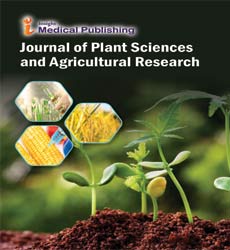Plant Metabolism for Industrial and Therapeutic Protein Production
Akio Nakamura*
Department of Biotechnology, Tohoku University, Sendai, Japan
- *Corresponding Author:
- Akio Nakamura
Department of Biotechnology, Tohoku University, Sendai,
Japan,
E-mail: nakamura_a@tumc.jp
Received date: August 22, 2024, Manuscript No. IPJPSAR-24-19137; Editor assigned date: August 26, 2024, PreQC No. IPJPSAR-24-19137 (PQ); Reviewed date: September 09, 2024, QC No. IPJPSAR-24-19137; Revised date: September 17, 2024, Manuscript No. IPJPSAR-24-19137 (R); Published date: September 23, 2024, DOI: 10.36648/ipjpsar.8.3.149
Citation: Nakamura A (2024) Plant Metabolism for Industrial and Therapeutic Protein Production. J Plant Sci Agri Res Vol.8 No.3: 149.
Description
Molecular farming, also known as biopharming or molecular agriculture, is a innovative technology that involves the use of genetically engineered plants to produce high-value pharmaceuticals, industrial enzymes, vaccines and other bio products. Unlike traditional agriculture, which primarily focuses on food and fiber production, molecular farming harnesses the natural ability of plants to serve as bio factories for the production of complex proteins and molecules of interest. This innovative approach holds immense promise for revolutionizing the pharmaceutical and biotechnology industries, offering numerous advantages such as cost-effectiveness, scalability and sustainability.
The molecular farming lies genetic engineering, a powerful tool that enables scientists to introduce foreign genes encoding desired proteins into plant genomes. These genes, known as transgenes, are typically incorporated into plant cells using various methods such as agrobacterium-mediated transformation, biolistic (gene gun), or viral vectors. Once integrated, the transgenes instruct the plant cells to produce the target proteins, which can then be harvested, purified and used for various applications.
Transgenic crops
One of the key advantages of molecular farming is its costeffectiveness compared to traditional protein production methods. Conventional manufacturing processes for pharmaceuticals and bio products often involve expensive facilities, specialized equipment and labor-intensive purification steps. In contrast, plants offer a cost-efficient platform for protein production, as they can be grown on a large scale in agricultural fields or controlled environments such as greenhouses. This scalability enables the production of high volumes of recombinant proteins at a fraction of the cost, making molecular farming an attractive alternative for the pharmaceutical industry.
Furthermore, plants offer several unique advantages as production hosts for biopharmaceuticals. They are capable of performing post-translational modifications such as glycosylation, which are essential for the biological activity and stability of many therapeutic proteins. Additionally, plants are inherently safe for producing pharmaceuticals, as they do not harbor human pathogens and offer containment measures to prevent cross-contamination with food crops or the environment. Molecular farming has already demonstrated its potential in producing a wide range of biopharmaceuticals and bio products with therapeutic, diagnostic and industrial applications. For instance, plants have been successfully engineered to produce vaccines against infectious diseases such as influenza, hepatitis B and Ebola virus. These plant-based vaccines offer several advantages over traditional vaccine production methods, including rapid scalability, reduced production costs and improved stability at ambient temperatures, which is particularly beneficial for vaccine distribution in resource-limited settings.
In addition to vaccines, molecular farming has been utilized to produce therapeutic proteins for treating various medical conditions, including cancer, autoimmune diseases and enzyme deficiencies. For example, transgenic plants have been engineered to produce monoclonal antibodies, insulin, growth factors and other biologics with potential therapeutic applications. These plant-derived proteins hold promise for providing affordable and accessible treatments for patients worldwide, particularly in developing countries where access to conventional biopharmaceuticals is limited.
Moreover, molecular farming is not limited to pharmaceuticals and vaccines but extends to the production of industrial enzymes, biofuels, bioplastics and other high-value bio product0073. Enzymes produced in plants can be used in a wide range of industrial processes, including food processing, textile manufacturing, biofuel production and waste treatment. By leveraging the natural diversity of plant species and their metabolic pathways, researchers can engineer plants to produce enzymes with tailored properties and functionalities, thereby expanding the applications and market opportunities for molecular farming.
Despite its tremendous potential, molecular farming also faces several challenges and considerations that need to be addressed for its widespread adoption and commercialization. These include regulatory requirements, biosafety concerns, public acceptance, intellectual property issues and scalability of production. However, ongoing research and technological advancements continue to overcome these challenges and pave the way for the realization of molecular farming's full potential in delivering innovative solutions for healthcare, agriculture and industry.
Open Access Journals
- Aquaculture & Veterinary Science
- Chemistry & Chemical Sciences
- Clinical Sciences
- Engineering
- General Science
- Genetics & Molecular Biology
- Health Care & Nursing
- Immunology & Microbiology
- Materials Science
- Mathematics & Physics
- Medical Sciences
- Neurology & Psychiatry
- Oncology & Cancer Science
- Pharmaceutical Sciences
